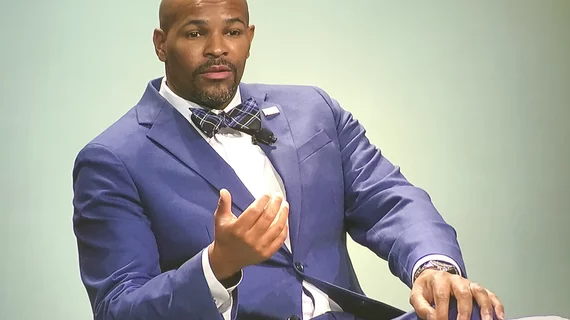Former surgeon general says cardiologists need to address hypertension and remaining COVID cases
Former U.S. Surgeon General Jerome Adams, MD, (2017-2021) spoke at the opening session of the American Heart Association (AHA) 2022 Scientific Sessions last week. He said cardiologists need to help end the COVID pandemic and tackle the even bigger epidemic of hypertension. Adams highlighted hypertension and called it a clear public health emergency, causing more than 670,000 U.S. deaths per year.
Pushing vaccination could help eliminate most remaining COVID deaths and alleviate hospital volumes
Adams is known for his role in the U.S. COVID-19 response. While COVID numbers have greatly declined, he noted that COVID is still killing a couple hundred people every day in the U.S. He said the vast majority of these COVID deaths are in unvaccinated patients, which cardiologists can help address by pushing their unvaccinated patients to get vaccinated.
According to the Centers for Disease Control and Prevention (CDC), more than 80% of the U.S. population has been vaccinated for COVID. But addressing the last 20% would help in mitigating death, Adams said.
“Shame on us for not pushing more to get our patients vaccinated,” Adam’s said. He said cardiologists are already seeing patients who are at high risk for COVID and should be doing more to convince them to get the COVID vaccine.
Physicians should be pushing patients more aggressively not just on COVID vaccinations, but also for the flu and other preventable diseases. He said COVID misinformation brought vaccine hesitancy to a new high, and it has become a big issue leading to very visible consequences.
"People are dying in the hallways of hospitals because they cannot get a hospital bed because so many people are being admitted for respiratory diseases. This is because so many people are not getting vaccinated for preventable diseases like the flu and pneumonia," Adams said.
Hypertension is a national health emergency not being addressed
Adams also noted cardiology needs to address the even bigger epidemic of hypertension.
“More people died of hypertension than from COVID in 2020,” Adam’s explained. "Everyone was watching counters for COVID-positive cases and deaths, but we don’t have anything like that for hypertension where the numbers are much higher."
He said hypertension is a public health emergency that needs to become more public and addressed more aggressively.
In 2020, the CDC said there were more than 670,000 deaths in the United States that had hypertension as a primary or contributing cause. The CDC says nearly half of U.S. adults (47%, or 116 million) have hypertension, defined as a systolic blood pressure greater than 130 mmHg or a diastolic blood pressure greater than 80 mmHg or are taking medication for hypertension.
The CDC also reports that only about 24% of people with hypertension have their condition under control. About half of adults (45%) with uncontrolled hypertension have a blood pressure of 140/90 mmHg or higher. This includes 37 million U.S. adults.
About 34 million adults who are recommended to take medication may need it to be prescribed and to start taking it. Almost two out of three of this group (19 million) have a blood pressure of 140/90 mmHg or higher. Left untreated or undertreated, hypertension can cause heart attacks, stroke, heart failure, kidney disease, sexual dysfunction, chest pain and peripheral artery disease.
The AHA has been a major advocate for increasing awareness about problems caused by hypertension and the need to address the growing public health problem with more screening and prevention. While the AHA promotes public awareness campaigns on hypertension, Adams said more can be done by cardiologists to help raise awareness and tackle the problem.

